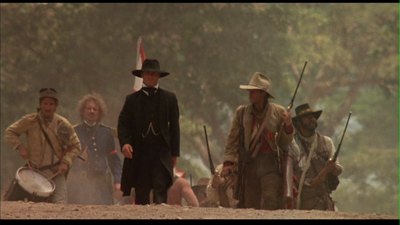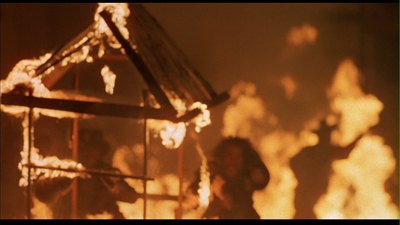| Reviews & Columns |
|
Reviews DVD TV on DVD Blu-ray 4K UHD International DVDs In Theaters Reviews by Studio Video Games Features Collector Series DVDs Easter Egg Database Interviews DVD Talk Radio Feature Articles Columns Anime Talk DVD Savant Horror DVDs The M.O.D. Squad Art House HD Talk Silent DVD
|
DVD Talk Forum |
|
|
| Resources |
|
DVD Price Search Customer Service #'s RCE Info Links |
|
Columns
|
|
|
Walker - Criterion Collection
THE MOVIE:

Agitprop is not usually big box office, because usually the time it is needed most is when people have the least interest in hearing it. After the success of Sid & Nancy and Repo Man, director Alex Cox was poised to be the hottest young turk in Hollywood, but after his cultish misfire Straight to Hell, he decided to get more contrary and difficult and make a film about the lingering consequences of America's involvement in the social unrest in Nicaragua. Working with screenwriter Rudy Wurlitzer (Two-Lane Blacktop), Cox made Walker in 1987, when the U.S. government's support of the rebels attempting to overthrow the Sandinista government was still a hotbed of lies and controversy. Needles to say, the Me Decade wasn't interested.
Walker is the story of William Walker (Ed Harris), a renaissance man who abandoned safe, lucrative jobs as a doctor and a lawyer to pursue adventure in support of a puffed-up faith in democracy. After he failed to foment a revolution in Mexico in the mid-1800s, Walker, who often referred to himself in the third person, was convinced to go down to Nicaragua to secure an overthrow of the nation's government on behalf of industrialist Cornelius Vanderbilt (Peter Boyle). Vanderbilt cared nothing about democracy beyond it being a means for him to secure exclusive rights of trade through Nicaragua; that means was a tool to secure Walker's service. Such are dirty deals made in the American system.
As a character, Walker is a complex mixture of personal pain, pride, and conviction--a perfect concoction for an actor with Ed Harris' stoic intensity. His decision to take Vanderbilt's assignment comes after he loses his fiancée (Marlee Matlin) to cholera, and so jumping back into battle is as much to hide from his grief as it is a righteous cause. He also rejected God on her deathbed, so his moral posturing has lost some of its gravity. Not that he expresses any of this. A reserved man, he keeps his thoughts bottled up and conducts himself with a self-possessed rigidity. He is a walking, breathing embodiment of Manifest Destiny, strutting imperiously through gunfire and chaos without being harmed. Parts of Walker's journals are used as voiceover, often as ironic commentary to the action. He was the greatest of spin doctors, turning the bleakest situation into propaganda.

Wurlitzer and Cox establish a darkly comic tone for their satire. The filmmaking style of Walker is just shy of crossing the line into gonzo territory. Cox uses several incongruous elements to achieve a sense of irony in the picture. This notably includes former Clash-frontman Joe Strummer's peppy, Latin-flavored score, which pairs mariachi horns with slow-motion death and destruction. The most talked about incongruity, though, is the introduction of anachronistic elements. We see the wealthy businessmen of the region reading Newsweek and Walker's face on the cover of Time. At the climax, the modern world comes crashing into the old one in all of its mechanized glory, changing the fate of William Walker in one dramatic swoop.
I think you'd have to be a dunderhead to miss Cox's point: the Reagan administration's campaign to interfere in Nicaragua is part of a long history of U.S. interference in that country. In the 1850s, the people rose up and eventually kicked us out, and this was exactly what was happening again in the 1980s. America's cockiness was no match for the will of the people, and democracy did not mean foreign rule. Walker's ultimate fate is also part of a larger pattern of U.S. backed dictators that grow mad with power and get abandoned by the people who put them in its seat. In order to maintain control of the nation, William Walker betrays each of his principles one by one, and with each restraint that gets lifted, the world around him declines deeper into madness. By the end, it's beginning to look a lot like Apocalypse Now, something that was likely intentional given that Cox begins his closing credits with a clip of President Reagan insisting comparisons between Nicaragua and Vietnam to be baseless. Sarcastic juxtaposition, anyone?
Though many of today's cable news pundits would have us believe that history is vindicating Reagan in all things, more rational minds will show the advantage is Alex Cox's. Just as history will also likely not be in George W. Bush's favor for leading America into virtually the same swampy morality of greed with his campaign in Iraq.
But just because Alex Cox is right, does that make Walker any good? I'd say the answer is yes and no, but mostly yes. The film received a pretty horrendous critical drubbing in 1987, and I'd say unfairly. The film does have its faults. There are times when it feels like the director is in less control of his picture than he should be, and it comes dangerously close to veering off the edge. If you'll indulge another reference to Apocalypse Now, in much the same way the insanity of the war he was portraying infected Francis Ford Coppola, so too does it feel like Cox is getting lost in the carnage of Nicaragua. Just as William Walker couldn't keep a firm grip on his army, the final film suggests Alex Cox found Walker a slippery fish.
Even so, as I said, the answer is mostly yes, the film is mostly good. Walker remains as potent a blast of political anger twenty years later. Its reemergence on DVD for this excellent Criterion edition has come at just the right time, too. Given all the madness around us, maybe a bloody, anarchic allegory will restore a little lucidity to the arena.
One can only hope.

THE DVD
Video:
The Walker - Criterion Collection DVD comes with a new high-definition transfer overseen by Alex Cox. Shown at a 1.85:1 aspect ratio, the image is vibrant and clean. I saw a couple of lines running down the screen in one battle scene, but they passed quickly and will likely be missed by most people. Otherwise, this is a beautiful print.
Sound:
A fancier soundtrack than the basic mono could have probably added even more depth to the audio, but as it is, it still sounds really good. Joe Strummer's music has a lot of nuance to it, and as it plays through most of the movie, the balance between the score, the dialogue, and the sound effects is spot-on.
Subtitles for the deaf and hearing impaired are also available.
Extras:
Walker is packaged in the new Criterion standard of a clear plastic case, with a cover printed on both sides. There is a 44-page booklet included, full of awesome behind-the-scenes photographs, chapter listings, credits, supplemental essays by Graham Fuller and Linda Sandoval, and a reprint of Rudy Wurlitzer's original introduction to the printed screenplay, a collage of his own thoughts alongside musings by other members of the production and excerpts from historical records. The whole design of this release is fantastic.
Two supplemental galleries on the DVD show the more standard behind-the-scenes photographs and also continuity Polaroids, many of which are also featured in the interior booklet.
Of the handful of extras, there are two substantial features and a few shorter selections. The first of the longer ones is the full-length audio commentary with director Alex Cox and writer Rudy Wurlitzer. It's a captivating conversation between two very opinionated people who are on the same page and excited by their ideas. The genesis of the project, the intentions of the creators, and the way things take on a life of their own once cameras roll all get coverage, as does the hindsight of current events that lends credence to their central thesis that history is a cycle of repeated mistakes.
The second longer feature is "Dispatches from Nicaragua," just over fifty minutes of documentary footage shot by Terry Schwartz during the making of Walker that has been edited together for the first time. The comprehensive documentary covers all aspects of production, has interviews from on-set in Nicaragua, and also gives some historical perspective for the both the time period of the film's story and the time period in which it was made. It's quite good, and even features footage of scenes being shot that didn't make the final cut of the movie. The sequences away from the film set, showing the local political protest against the American invasion, are particularly poignant, as is the final scene of a man who lost his son to the war appealing to the camera. More amusing is the Nicaraguan Minster of the Interior hijacking a second-unit to interject his own direction. Also, fans of Joe Strummer will enjoy his colorful commentary and hamming for the camera.
"On Moviemaking and the Revolution" is a short (about fifteen minutes) audio monologue of an extra on the film reminiscing about being a part of shooting Walker. It's odd that this was presented without any video to go with it, as the speaker is watching the movie and referring to specific things that we can't see, including pointing out where he is in the crowd. It's entertaining, though his manner of speaking is a bit showy.
Though listed on the back cover, the six-minute "Cox on Walker's Reviews" is set-up like an Easter Egg. Keep moving your arrow key down on the main menu until the "A" in Walker is illuminated. Hit "OK" for a new film of Alex Cox reading through the clip file and dismissing the vitriol leveled at his movie in 1987.
FINAL THOUGHTS:
The release of the Walker - Criterion Collection DVD is a chance to fix the maligned reputation of a dangerously funny, violent political satire that didn't get its due in 1987. Alex Cox's anarchic portrayal of the cyclical nature of America's aggressive policies in Nicaragua is a blistering indictment of our country's lingering sense of Manifest Destiny. Watching it brings some laughs, a few shudders, and more than one "what the--?" moment. It's not perfect, but its heart is in the right place, and the constant forward movement of the story means you don't really have time to get bored with it. Recommended. An excellent package that builds on the original intent of a rebellious movie.

Jamie S. Rich is a novelist and comic book writer. He is best known for his collaborations with Joelle Jones, including the hardboiled crime comic book You Have Killed Me, the challenging romance 12 Reasons Why I Love Her, and the 2007 prose novel Have You Seen the Horizon Lately?, for which Jones did the cover. All three were published by Oni Press. His most recent projects include the futuristic romance A Boy and a Girl with Natalie Nourigat; Archer Coe and the Thousand Natural Shocks, a loopy crime tale drawn by Dan Christensen; and the horror miniseries Madame Frankenstein, a collaboration with Megan Levens. Follow Rich's blog at Confessions123.com.
|
| Popular Reviews |
| Sponsored Links |
|
|
| Sponsored Links |
|
|
| Release List | Reviews | Shop | Newsletter | Forum | DVD Giveaways | Blu-Ray | Advertise |
|
Copyright 2024 DVDTalk.com All Rights Reserved. Legal Info, Privacy Policy, Terms of Use,
Manage Preferences,
Your Privacy Choices | |||||||













